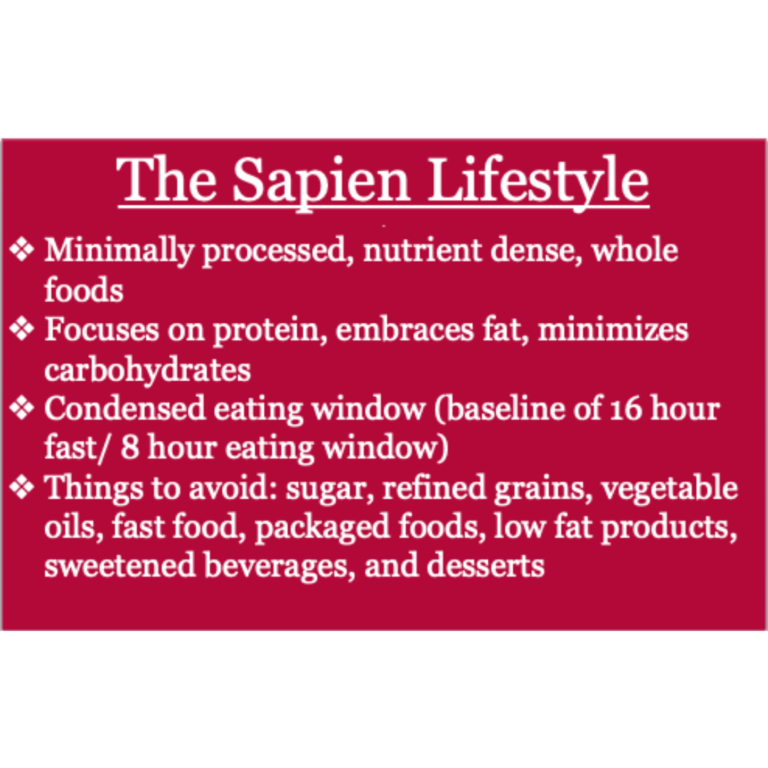
The Sapien Lifestyle and Its Effects on the Markers of Metabolic Disease
Deandra K. Kuruppu, B.S. and Gary I. Shlifer, D.O.
Rocky Vista University College of Osteopathic Medicine and Evolve Healthcare
Approved by the Institutional Review Board on October 12, 2022. IRB # 2022-168
In the primary care setting, one of the most common questions and issues patients present with is how to lose weight and optimize their nutrition and lifestyle strategies. While lifestyle modifications are always the first recommendation to address weight loss and metabolic health, there is little guidance provided as to which specific modifications will have the most powerful effect. Unfortunately, there are limited studies on the various diets/interventions that are marketed today and their effects on metabolic disease. The Sapien diet consists of high protein intake, low carbohydrate consumption, and a focus on healthy fat consumption. While this concept is debatable, our hypothesis is that a whole food-based low carbohydrate diet that integrates intermittent fasting strategies will produce an improvement in patients’ metabolic markers, weight, and ultimately chronic disease management. A retrospective observational study was conducted using outpatient data from 2017 to 2022 at Evolve Healthcare. The data analysis revealed a significant decrease in BMI, triglycerides (TGL), and TGL/HDL ratio from baseline to 18 months. Through our work, we learned that nutritional research is difficult to conduct due to the overwhelming number of confounding variables and the difficulty in assuring compliance. As a result, most nutrition research is observational in nature and there is much disagreement in the scientific community about the most optimal approach to nutrition and lifestyle.
Introduction
Metabolic syndrome has become increasingly prevalent among adults in the United States, a 56% increase in prevalence among males and a 47% increase among females after an 8-year follow up during the Framingham Heart Study. 7 There are a variety of diets such as the Atkins diet, the South Beach Diet, the Paleo diet, etc. that have been created to help with weight loss and eating healthier, but there is limited research on how effective these diets are. The Sapien Diet is a novel dietary intervention created by Dr. Igor Gary Shlifer, D.O. and Brian Sanders. This dietary strategy combines a low carbohydrate, high protein diet (Atkins diet) with intermittent fasting, while embracing
healthy fat (modified Atkins diet/Paleo diet) to help people reverse metabolic disease and thrive, rather than just survive. This lifestyle is based on evolutionary history, modern ancestral traditions, and modern science with the goal of creating a framework that is sustainable and long term.6
The primary driver of obesity and metabolic disease is the process of insulin resistance. Unfortunately, standard American diet guidelines promote a relatively high carbohydrate intake, high sugar intake and a lack of emphasis on appropriate omega-3 fatty acid intake and protein intake. There is also confusion about meal frequency, but it has become increasingly apparent that intermittent fasting strategies or condensed eating windows will support healthy metabolic processes and help with weight loss.5 Multiple metabolic markers have been studied in the past and while there has been an extensive focus on measuring HgbA1c and LDL as well as total cholesterol, evidence suggests that a more sensitive marker for metabolic health includes the triglyceride to HDL ratio, triglycerides reflecting blood sugars and HDL reflecting healthy cholesterol metabolism. 1,2 Fasting insulin levels act as an early marker of insulin resistance before HgbA1C elevation and even before fasting blood sugar elevation occurs, thus these should be considered an assessment of metabolic health.4 High sensitivity CRP also acts as a proxy marker for metabolic health and specifically cardiovascular disease risk. 3

Method
A retrospective observational study was conducted using AdvancedMD outpatient data from November 2017 to September 2022 at Evolve Healthcare, a primary care office in Woodland Hills, California. Evolve Healthcare is the office that educates and instills the Sapien Lifestyle to patients, which is why it was chosen for this study. Individual records were retrieved from internal medicine clinic visits and screened for BMI > 25, ages 18-75, and those that had been counseled on weight loss/Sapien Lifestyle with a minimum of three office visits. We used a minimum of three visits as a marker of compliance. Patients with Type 1 DM or those taking insulin were excluded from this study. Values analyzed included: BMI, HgbA1C%, total cholesterol, HDL, triglycerides, LDL, triglycerides/HDL ratio, fasting insulin and CRP. Baseline lab values (before Sapien Lifestyle intervention) were compared to values at various follow up visits up to 18 months. A repeated measures analysis was used to calculate the average value of each marker at baseline and 18 months with standard error also noted. Statistical significance was determined if the p-value was less than 0.05,
indicating a difference existed among the average values of each metabolic marker.
Results
There are limited studies on nutrition and its effects on metabolic disease, specifically investigating long-term sustainability of a low-carbohydrate, high fat lifestyle within our healthcare system. Our goal was to investigate how the Sapien Diet and Lifestyle affects markers of metabolic disease over the course of 18 months. Our data analysis revealed a significant reduction in triglycerides, BMI, fasting insulin, and the TGL/HDL ratio in those who incorporated the Sapien diet into their lifestyle when lab values were compared at baseline and 18 months. Early detection of elevated TGL/HDL ratios can help serve as an early marker for detection of atherosclerotic complications providing primary care providers with objective data to help intervene early in their patients. 1 Early detection of an elevated fasting insulin can also help primary care providers detect if a patient is progressing towards diabetes mellitus. This study showcases how diet and lifestyle can help with weight loss/maintenance, disease prevention, and potentially metabolic disease reversal.
There are no documented research experiments evaluating the effectiveness of the Sapien Lifestyle on the markers of metabolic disease, which prompted this research investigation. In fact, there is no research comparing lifestyle modifications versus pharmaceutical intervention for the management of metabolic disease.
Limitations of the study include analyzing compliance which is difficult unless a feeding study is performed, which can be costly and difficult as well. Therefore, most research is done through observational analysis, which is challenging to
control for confounding variables. Further research needs to be performed instead, focusing on comparing lifestyle modifications to cholesterol lowering medications. Furthermore, most research on metabolic health is driven by the pharmaceutical industry with the goal of showing the benefits of a particular pharmaceutical drugs. Lifestyle modifications need to be assessed against pharmaceutical interventions and this research has not yet been completed. Our research indicates that the Sapien Diet and Lifestyle improves overall biomarkers and improves BMI.



References
1. Chauhan A, Singhal A, Goyal P. TG/HDL Ratio: A marker for insulin resistance and atherosclerosis in prediabetics or not?. J Family Med Prim Care. 2021;10(10):3700. doi:10.4103/jfmpc.jfmpc_165_21
2. da Luz PL, Favarato D, Faria-Neto JR Jr, et al. High ratio of triglycerides to HDL-cholesterol predicts extensive coronary disease. Clinics (Sao Paulo). 2008;63(4):427-432. doi:10.1590/s1807-59322008000400003
3. Jellinger PS, Handelsman Y, Rosenblit PD, et al. American Association Of Clinical Endocrinologists And American College Of Endocrinology Guidelines For Management Of Dyslipidemia And Prevention Of Cardiovascular Disease. Endocr Pract. 2017;23(Suppl 2):1-87. doi:10.4158/EP171764.APPGL
4. Mantzoros C. Insulin resistance: Definition and clinical spectrum. UpToDate. https://www.uptodate.com/contents/insulin-resistance-definition-and-clinical-spectrum?search=fasting%20insulin%20level&source=search_result&selectedTitle=2~150&usage_type=default&display_rank=2. Published March 14, 2022. Accessed October 4, 2022.
5. Perreault L, Delahanty L, 2022. Obesity in adults: Dietary therapy. [online] Uptodate.com. Available at: <https://www.uptodate.com/contents/obesity-in-adults-dietary-therapy?search=intermittent%20fasting&source=search_result&selectedTitle=1~150&usage_type=default&display_rank=1#H1663585502> [Accessed 10 October 2022].
6. Shlifer G, Sanders B. The Sapien Diet Framework. https://www.sapien.org/diet. Published 2022. Accessed October 4, 2022.
7. Wilson PW, D’Agostino RB, Parise H, et al. Metabolic syndrome as a precursor of cardiovascular disease and type 2 diabetes mellitus. Circulation 2005; 112:3066.
Acknowledgements
This was a retrospective observational study and permission was granted for data collection and analysis by Evolve Healthcare.
Thank you to Dr. Mark Payton, statistician, for performing the data analysis.
Request an Appointment
- Someone will reach out by the next business day.